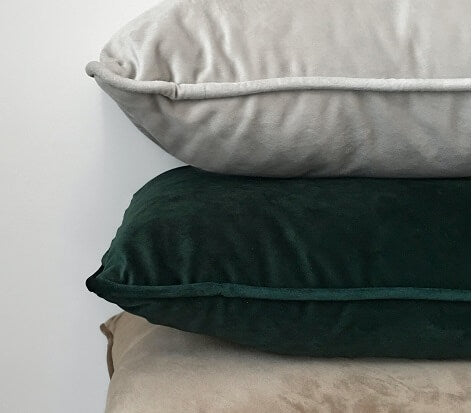The Science Behind Shaped Pillows, and Their Impact on Sleep Quality Have you ever considered the impact that your pillow has on the quality of your sleep? Most of us spend hours each night on our pillows, yet we often overlook their importance in ensuring a restful night's sleep. One choice is body pillows vs regular pillows. Shaped pillows, such as those designed to support the neck or align the spine, have been gaining attention for their potential to improve sleep quality. Backed by scientific research, these pillow shapes offer more than just comfort – they may actually help you achieve a better night's rest. In this blog post, we will explore the science behind shaped pillows and their surprising impact on sleep quality.

Understanding the Science Behind Shaped Pillows
Shaped pillows are ingeniously crafted to fit the natural curves of the body, providing unparalleled support and alignment, especially for the head and neck area. The key lies in their ability to distribute weight evenly, minimizing the pressure on any single point along the neck, shoulders, and spine. This distribution of weight not only alleviates existing discomfort but also works proactively to prevent the onset of pain and tension that can arise from improper sleep posture. The ergonomic design of these pillows plays a pivotal role in maintaining the spine's natural curvature, a crucial factor for achieving restorative sleep. By ensuring that the head, neck, and spine are correctly aligned, shaped pillows foster an optimal sleeping environment, conducive to both physical and mental rejuvenation. This alignment is vital for the body's recovery processes during the night, facilitating a deeper and more beneficial sleep cycle. Furthermore, the specific contours of shaped pillows cater to a wide array of sleep positions, providing tailored support that can adjust to individual needs and preferences. This personalized approach to sleep comfort underscores the scientific foundation upon which shaped pillows are designed, highlighting their significance in promoting a healthier, more restful night's sleep.
The Role of Ergonomics in Sleep Quality
Ergonomics is fundamental in creating a sleep environment that fosters restfulness and rejuvenation. Specifically, the design and functionality of shaped pillows embody ergonomic principles, aimed at optimizing the sleeper's posture and comfort through the night. These pillows are tailored to ensure that every curve and contour of the body is supported, preventing the common pitfalls of a misaligned spine, and the subsequent strain on the neck and shoulders. Such proactive support not only enhances the quality of sleep but also mitigates the risk of waking up with aches or stiffness, commonly attributed to poor sleeping positions. With ergonomics at the forefront, shaped pillows are instrumental in promoting a seamless alignment of the body, facilitating a tranquil transition through the sleep cycles. The targeted support offered by these pillows underscores their role in a holistic approach to sleep ergonomics, emphasizing their contribution to a sleep sanctuary that is both nurturing and restorative. Through their ergonomic design, shaped pillows serve as a cornerstone in achieving a night of sleep that is both physically and mentally restorative, embodying the perfect balance between comfort and support.
Some pillow shapes allow you to sleep better, while others provide support to your back while you are in bed relaxing with a book or watching TV. Rectangular pillows help you sleep better. We generally recommend the rectangular pillow for sleeping.
Examining the Research: How Shaped Pillows Improve Sleep
A growing body of scientific evidence underscores the role of shaped pillows in enhancing sleep quality. Through meticulous studies, researchers have discovered that these ergonomically designed pillows significantly contribute to reducing neck pain and fostering an ideal sleep posture, which, in turn, elevates the overall sleeping experience. The distinction of shaped pillows lies in their ability to maintain the spine's alignment throughout the night, a critical aspect that traditional pillows often fail to address. One study highlighted that participants using shaped pillows reported a notable decrease in waking up due to discomfort and an increase in the quality of their sleep compared to those using standard pillows. Another investigation focused on individuals with chronic neck pain and found that the introduction of a shaped pillow resulted in measurable improvements in pain levels and sleep quality over a controlled period. These findings are complemented by research that delves into the specific contours and materials of shaped pillows, such as memory foam, which contours to the body's shape, thereby optimizing support and reducing the need for constant readjustment throughout the night. Together, these studies paint a compelling picture of the potential benefits shaped pillows have on sleep quality, supporting the notion that the right pillow design can be a simple yet effective tool in achieving restful and restorative sleep.
Types of Shaped Pillows and Their Specific Benefits
Within the diverse range of shaped pillows, each variant serves a unique purpose, catering to various physical needs and sleep challenges. Cervial pillows, for instance, are expertly shaped to cradle the neck, offering relief and support that encourages proper spinal alignment, which is vital for a comfortable night’s sleep and for alleviating neck strain. Contour pillows, on the other hand, feature a distinctive dip that ideally suits the shape of the head and neck, providing an even distribution of pressure that can help diminish pain and enhance sleep comfort. Wedge pillows offer a different type of benefit by elevating the upper body. This elevation is particularly beneficial for those who experience acid reflux or snoring, as it helps keep the airways open and allows for a more comfortable breathing pattern. Additionally, lumbar pillows support the lower back, promoting a natural spinal curvature and preventing lower back pain, a common ailment for many sleepers. Each type of shaped pillow brings forth specific benefits aimed at improving sleep quality by addressing individual health concerns and comfort preferences, illustrating the thoughtful design and purpose behind each variant.

Personal Testimonials: Real People, Real Results
The effectiveness of shaped pillows is not just supported by scientific research but also echoed in the experiences of countless individuals who have witnessed a transformation in their sleep patterns. From those plagued with chronic neck discomfort to the everyday sleeper seeking enhanced rest, the stories of improvement are diverse and impactful. One user described waking up feeling rejuvenated and free of the usual stiffness that plagued their mornings, attributing this change directly to their new cervical pillow. Another shared how their contour pillow drastically minimized their overnight tossing and turning, resulting in deeper sleep and more energetic days. Each testimonial underscores a common theme: the transition to using shaped pillows has led to noticeable advancements in sleep quality and physical wellbeing. These accounts, coming from a broad spectrum of backgrounds, highlight the universal appeal and effectiveness of shaped pillows, offering a personal glimpse into the difference they can make. Through these real-life insights, the value of choosing the right pillow for one’s needs becomes undeniably clear, reinforcing the connection between pillow shape and sleep enhancement.
Making the Switch: Tips for Choosing the Right Shaped Pillow
Embarking on the journey to select the perfect shaped pillow requires a thoughtful consideration of several key aspects. Start by evaluating your habitual sleeping position, as this directly influences the type of support your body demands. Side sleepers, for example, might benefit from a pillow that fills the space between their head and the mattress to maintain alignment of the spine, while back or stomach sleepers need a different kind of support. Acknowledge any specific ailments or discomforts, like chronic neck or back pain, which could be alleviated with targeted pillow designs. Firmness is another crucial factor; the ideal pillow should neither be too hard that it causes pressure nor too soft that it lacks support. Material preferences, including memory foam for its contouring properties or latex for resilience and bounce, should also be taken into account. For those with allergies, hypoallergenic materials can provide additional comfort and peace of mind. Lastly, don't hesitate to seek guidance from experts. A consultation with a chiropractor or a sleep therapist can provide personalized recommendations to match your unique needs. By meticulously considering these elements, you can confidently navigate towards a shaped pillow that promises a night of restful sleep.
Curved pillows
The curved shape can assist with supporting your head, neck, shoulders and back, making it ideal for side and back sleepers. These pillows help to prevent rolling over and can assist with elevating and reducing pressure on your neck as you sleep.
The Future of Sleep: Innovations in Shaped Pillow Design
As we look toward the horizon of sleep technology, the evolution of shaped pillow design promises even greater strides in enhancing our sleep experience. Innovations are emerging at a rapid pace, with developments such as breathable fabrics that regulate temperature, ensuring a cool and comfortable rest throughout the night. Cutting-edge materials that adapt to individual sleep patterns are also on the rise, offering personalized support that evolves with the sleeper's needs. Moreover, the integration of smart technology into pillow design is on the cusp of revolutionizing how we approach sleep health. Features like sleep tracking sensors and automatic adjustment capabilities based on the sleeper’s movement and snoring patterns are being explored. These advancements aim to not just improve sleep quality but also to contribute to overall health monitoring and management. As we embrace these innovations, the future of shaped pillows holds the potential to transform the very fabric of how we rest, making sleep not just a necessity but a truly rejuvenated experience.






